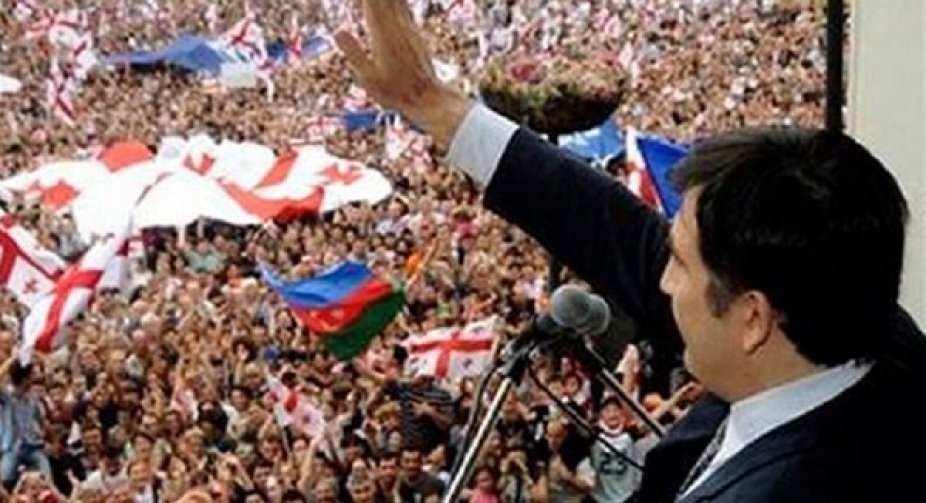The opposition Russo-phobic party leader in the Black Sea country of Georgia, Levan Khabeishvili, called for “revolutionary changes” three times in a recent speech, before calling for the people to be “mobilized to fight… otherwise we will become a province of Russia”.
The backdrop to the speech has been demonstrations by several large youth groups, NGOs, and political parties in opposition to the strangest of political trigger words one will ever read, “a proposed foreign agent registration bill”.
Nearly all countries on Earth have a foreign agent registration requirement, with few more draconian than the one passed in the United States. Their role in a democracy is unquestionably an important one: that organizations operating in the political, societal, or media sectors funded by foreign governments need to make that information available on a publically-managed database.
Not only is it standard practice in America for foreign lobbyists to register their activities, benefactors, and presence with US intelligence, but the Georgian draft legislation is actually a milder copy of the US Foreign Agent Registration Act (FARA).
Yet in Georgia, the parliament’s attempts to force a bill creating such a program into law have been met with the staunchest opposition.
US State Dept. Spokesman Ned Price told a reporter that “such a law…does not correspond to [what] we, the United States, aim to be Georgia’s partners and help them achieve this future,”.
Another US official, the Ambassador to Georgia Kelly Degnan, said of the proposed foreign agent registration that “we have not given up on the efforts to persuade and urge the government not to proceed with this legislation,” and added “these laws seem to be clearly in line with Russian law,” even though it was based on American law.
The exact same conditions that led to the bloodless coup d’etat in the country in 2003 are currently present—a populist Western puppet waiting in the wings, and an army of US-backed NGOs organizing civil society groups into boycotts and demonstrations.
The opposition party wants to release this puppet from prison, who has already taken his country to war with Russia before in 2008, whilst calling for the military mobilization of the country, and its entry into NATO.
At the protest rally at the ??parliament held to protest against the ??law on so-called ‘Foreign Agents,’ attendees could be heard chanting ‘Russians’ directed at members of the parliamentary majority, along with the playing song ‘Sakartvelo'(??) and ?? anthem.#NoToRussianLaw pic.twitter.com/pMl1FbZCbE
— Netgazeti (@netgazeti) March 6, 2023
Our men in Tbilisi
With Georgia being out of mainstream news for almost 15 years, some background is required.
One of the men at the forefront of this attempt is George Soros, founder of the US-backed non-governmental organizations (NGO) called the National Endowment for Democracy and the Open Society Institute, which have been used to overthrow several governments around the former-Soviet states of Yugoslavia, (2000) Ukraine (2004, 2014), Kyrgyzstan (2005), and Georgia itself in 2003.
Eduard Shevardnadze, the President of Georgia in 2003, warned that Soros should not be trusted, right up until he was ousted in the “Rose Revolution,” all of which you can literally read about on Wikipedia. By the time of the Rose Revolution, there were 2,000 NGOs operating in concert to get Shevardnadze out of power, who eventually yielded in a meeting organized by none other than the Russian Foreign Minister, Igor Ivanov.
Fast forward to 2005, and Soros himself admitted to using his NGOs to pay the salaries of the Georgian government that replaced Shevardnadze.
“I provided for Georgian public servants to get $1,200 a month… And now I am ready to support the creation of a fund like this in Kyrgyzstan,” he said in 2005 just after the Krygzstan government was overthrown in an astonishingly similar manner.
The second man in this story is Mikheil Saakashvili, the former President of Georgia who took power after Shevardnadze, and who in 2008 waged the Five Day War when he began shelling the breakaway province of South Ossetia at the US’ urging, killing several Russian peacekeepers.
“The Rose Revolution in 2003 is really the beginning of everything that’s going on in Ukraine now,” says Rick Rozoff, a retired columnist with 3-decades of experience following NATO-Soviet relations.
Saakashvili, who graduated from Colombia University and practiced law in New York City, then fled to Ukraine after losing the war, where he was eventually appointed a top aide by Volodymyr Zelenskyy.
Rozoff told WaL that in order to gain a promised spot in NATO, the newly-empowered Saakashvili had to remove Russian peacekeepers in three breakaway provinces of Georgia, called Abkhazia, South Ossetia, and Adjara.
“He started shelling South Ossetia and he killed several people including a Russian peacekeeper,” details Rozoff. “Georgia had the third largest contingent of troops in Iraq… Condoleeza Rice had just visited weeks before, [perhaps] to supervise the attack, and during the Five Days War the US flew all of those troops back to Georgia for the war with Russia”.
“That war ends and who is the first major US official to arrive in Tbilisi to offer $1 billion in international aid: Senator Joseph Biden”.
If you think the stories you’ve just read were worth a few dollars, consider donating here to our modest $500-a-year administration costs.





Bravo. This deserves the widest possible readership.